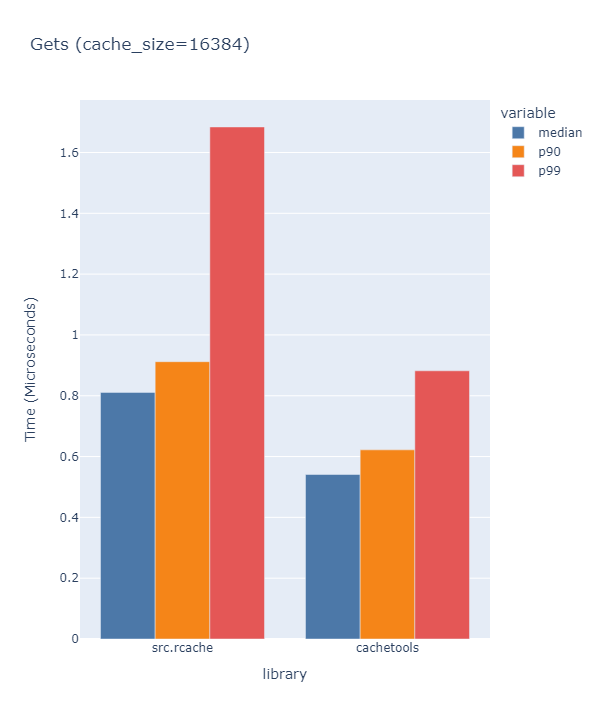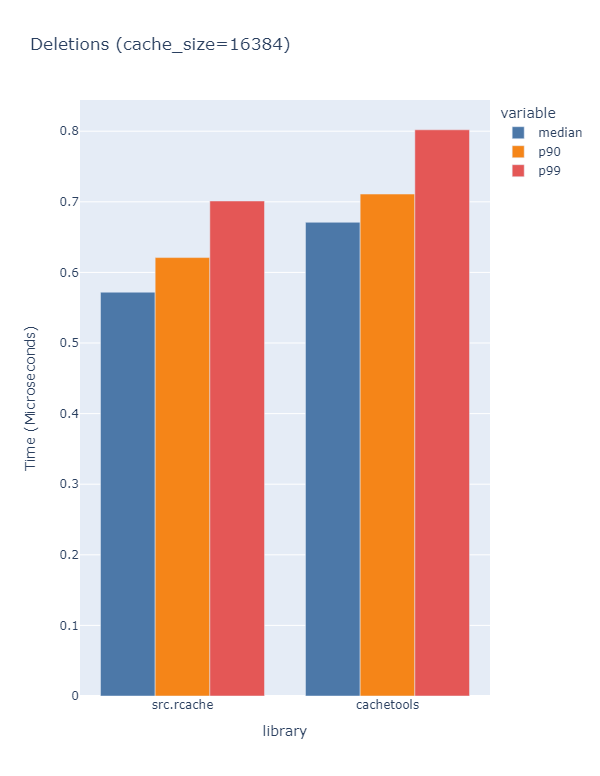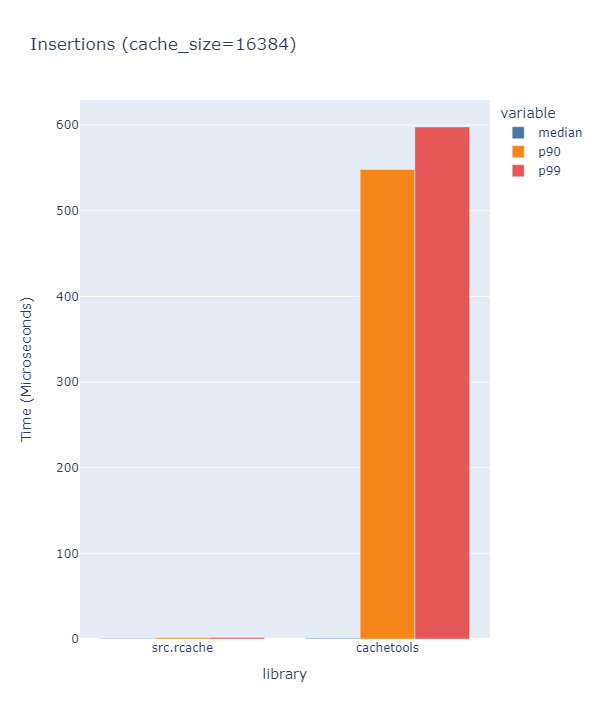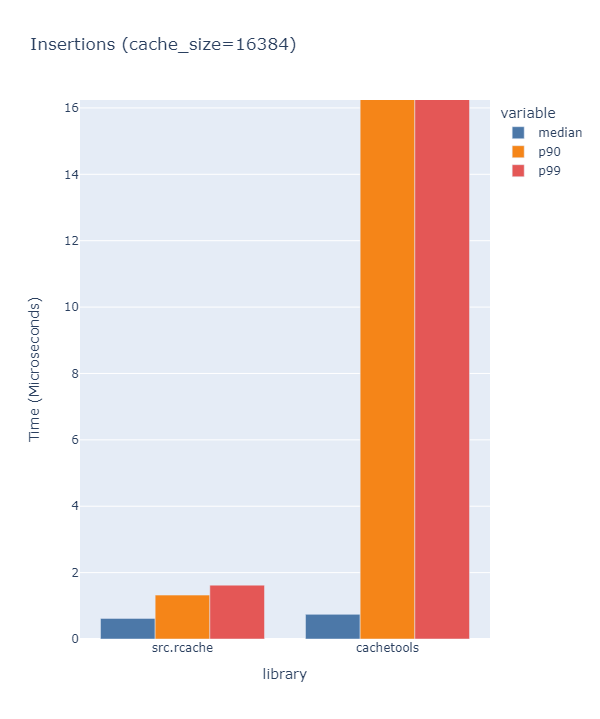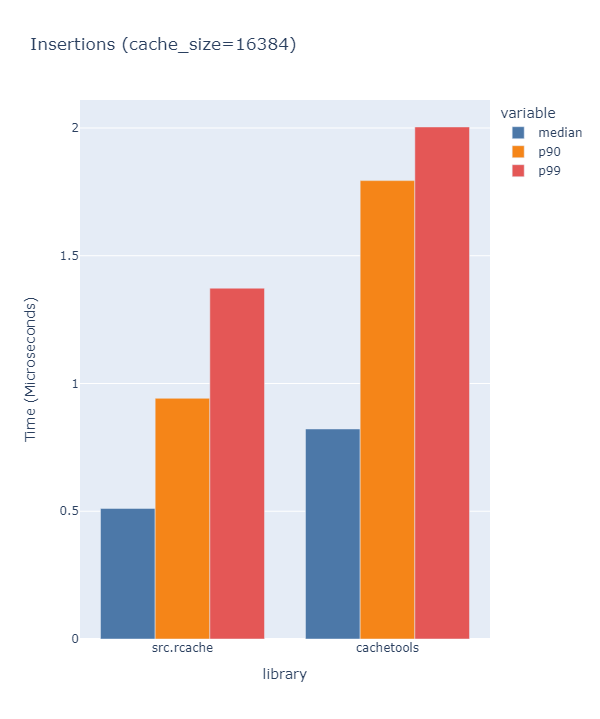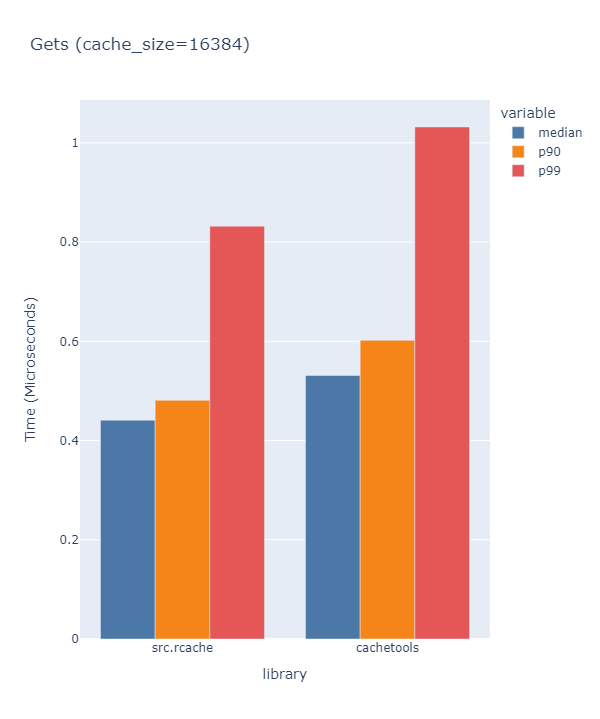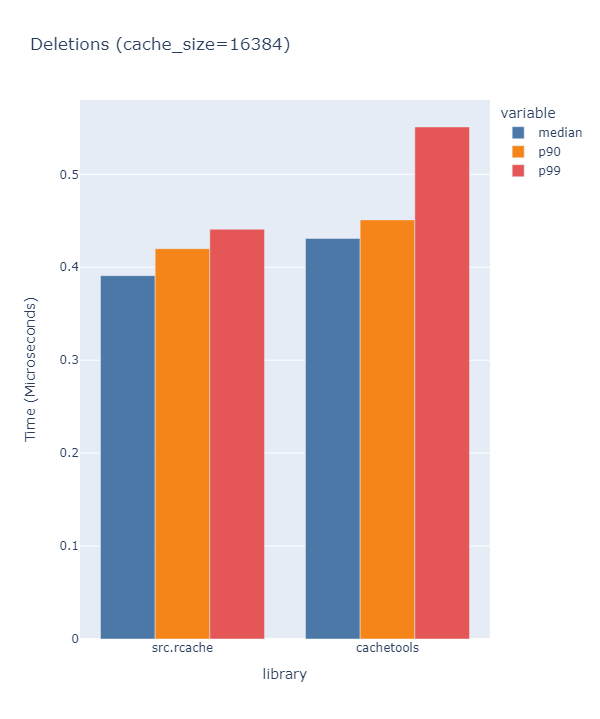The initial motivation behind this package was twofold: fix the long insertion/eviction times in cachetools.LFUCache and provide an alternative to the cachetools.TTLCache offering variable per-key TTL's.
pip install cacheing
And then in your python interpreter:
import cacheingpip install -U cacheing
from cacheing import LFUCache
cache = LFUCache(capacity=2)
cache[1] = 2
cache[2] = 3
cache[3] = 4
>>> cache
LFUCache{2: 3, 3: 4}cacheing provides a benchmarking library found in ./benchmark.
$ python3 ./benchmark.py --help
usage: benchmark [-h] [--cache [CACHE [CACHE ...]]] [--method [{get,set,delete} [{get,set,delete} ...]]]
arguments:
-h, --help show this help message and exit
--cache [CACHE [CACHE ...]], -c [CACHE [CACHE ...]]
cache(s) to benchmark. example: cacheing.LRUCache.
--method [{get,set,delete} [{get,set,delete} ...]], -m [{get,set,delete} [{get,set,delete} ...]]
method(s) to benchmark.$ cd benchmark
$ python3 ./benchmark.py --cache cachetools.LRUCache cacheing.LRUCache --method set get deleteAll benchmark times were measured using the provided benchmark library. See the
benchmark section for details. The default benchmarking configuration executes 100,000 get operations,
20,000 set operations and n = cache_size delete operations. The median, p90, and p99 times for each
operation, measured in microseconds, or 1e-6, are displayed in the figures below.
A callback function can be specified in the body of each cache constructor. The callback function is automatically invoked when an
item is evicted from the cache. The callback function signature should take two arguments mapping to the key and value of the evicted
item.
import datetime
from cacheing import LFUCache
# Define a Callback-Function
def _cache_log(key, value):
print(f"<{datetime.now()}> [Evict] {{{key}: {value}}}")
# Register Callback in the cache constructor
cache = LFUCache(capacity=2, callback=_cache_log)
cache[1] = 2
cache[2] = 3
cache[1] # Get
cache[2] # Get
cache[3] = 4
>>> cache
<2023-01-09 21:52:11.109161> [Evict] {1: 2}
LFUCache{2: 3, 3: 4}Evictions are performed using a "Least Frequently Used" eviction policy. Cache items are "ranked" based on their overall usage. When the cache is at capacity and a request is made to insert a new item, the item with the least overall usage is evicted.
Usage is tracked by-key. Gets and Sets are considered usage qualifiers.
See: LFU Benchmarks
from cacheing import LFUCache
cache = LFUCache(capacity=2)
cache[1] = 2
cache[2] = 3
cache[1] # Get
cache[2] # Get
cache[3] = 4
>>> cache
LFUCache{2: 3, 3: 4}Evictions are performed using a "Least Recently Used" eviction policy. Cache items are "ranked" based on how recently they were used. This is the reccomended cache to use when your data has high locality. When the cache is at capacity and a request is made to insert a new item, the least-recently accessed item is evicted.
Usage is tracked by-key. Gets and Sets are considered usage qualifiers.
See: LRU Benchmarks
from cacheing import LRUCache
cache = LRUCache(capacity=2)
cache[1] = 2
cache[2] = 3
cache[2] # Get
cache[1] # Get
cache[3] = 4
>>> cache
LRUCache{1: 2, 3: 4}VolatileCache's are inspired by the Redis API's of the same name. See Redis Eviction Policies.
VolatileCache's are variants of LFU, LRU, Random, and TTL Cache's offering optional item eviction. Specific cache items can be held in-memory
by setting their unique expire fields to False.
Volatile variant supported:
VolatileLFUCacheVolatileLFUCacheVolatileTTLCacheVolatileRandomCache
from cacheing import VolatileLRUCache
cache = VolatileLRUCache(capacity=2)
cache[1, False] = 2
cache[2, False] = 3
cache[3, True] = 4
>>> cache
VolatileLRUCache{1: 2, 2: 3}TTLCache is a time-aware cache implementation. The ttl field defines the global time-to-live binding each item in the
cache. The cache uses an underlying LRUCache to handle evictions. When the cache is at capacity and a request
is made to insert a new item, the least recently used item is evicted.
import asyncio
from cacheing import TTLCache
cache = TTLCache(capacity=2, ttl=5)
cache[1] = 2
cache[2] = 3
asyncio.sleep(5) # Some task
cache[3] = 4
>>> cache
TTLCache{3: 4}Like TTLCache, VTTLCache is a time-aware cache implementation. Time to lives are explicitly assigned per-key. The cache uses an underlying LRUCache to handle evictions. When the cache is at capacity and a request
is made to insert a new item, the least recently used item is evicted.
import asyncio
from cacheing import VTTLCache
cache = VTTLCache(capacity=2)
# cache[key, ttl] = value
cache[1, 5] = 2
cache[2, 6] = 3
asyncio.sleep(5) # Some task
cache[3, 5] = 4
>>> cache
VTTLCache{2: 3, 3: 4}Randomly select an item for eviction.
from cacheing import RandomCache
cache = RandomCache(capacity=2)
cache[1] = 2
cache[2] = 3
cache[1] # Get
cache[2] # Get
cache[3] = 4
>>> cache
RandomCache{1: 2, 3: 4}




